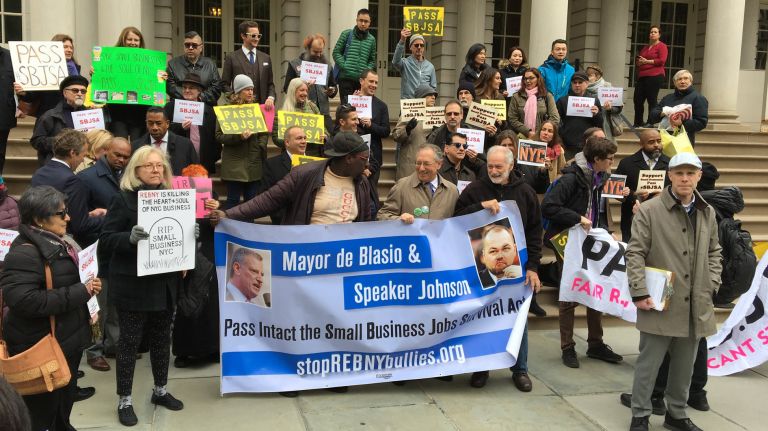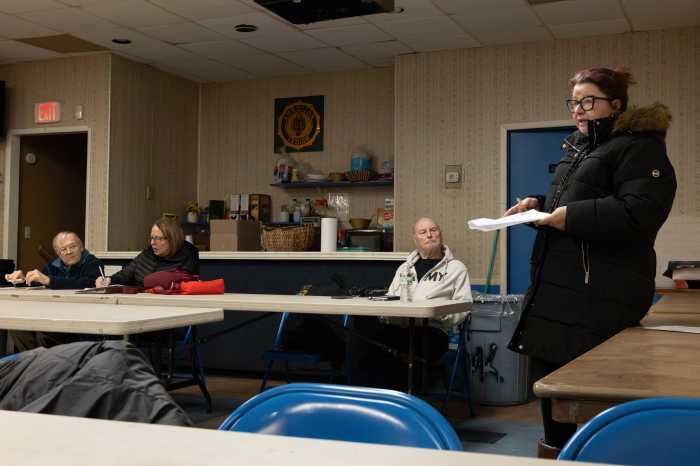After five years of capitalizing on recycled ink toner, Millennium Compatible Toner could not absorb the tripling of its rent in a South Bronx warehouse, and its president, Frank Garcia, laid off all but three of its 30 employees.
The company’s current crew is focused solely on sales but Garcia believes a bill before the City Council could help him secure the space needed to revive the manufacturing side of his business he lost along with the warehouse space in 2015.
"You need to give us equal say," said Garcia, while championing legislation that would, in most cases, entitle businesses to 10-year lease renewals.
At least 100 other supporters of the Small Business Jobs Survival Act swarmed a rally held outside City Hall Monday, where the Council held its first hearing in years on a measure that has been kicking around in one iteration or another for 30 years.

The current Small Business Jobs Survival Act, which has support from 16 lawmakers, would require owners of nonresidential spaces to notify tenants three months before their lease expires. At that point, businesses who have not breached the lease or violated the law would, generally, be guaranteed another 10-year lease, unless they choose to pursue a shorter-term arrangement. If negotiations stall, an arbitrator would look at paperwork from both sides and could hire consultants to analyze data and preview the space before putting forth a proposed lease.
In the event that the arbitrator’s arrangement is not amenable, the tenant would be allowed to remain in the space and pay 10 percent more in rent until the landlord finds an alternative occupant. At that point, the landlord would need to offer the same terms to the original tenant before inking a deal with the newcomer.
With more advanced notice, a property owner could sever ties with the company and plan to demolish or dramatically remodel the space or move their own business operations into it.
“The Small Business Jobs Survival Act will encourage both parties, property owners and small business owners to act honestly and to engage fairly when negotiating a commercial lease,” said Councilman Ydanis Rodriguez, who introduced the bill.
Mayor Bill de Blasio’s administration, however, said the legislation could pose several legal issues and may wind up making things worse for mom and pop shops. The city’s Small Business Services Commissioner Gregg Bishop said landlords and large chains would have the means to hire consultants and present more convincing testimony arbitrators.
"The party that makes the strongest case — often the party with the best resources — is likely to have a more favorable outcome," said Bishop, noting that the measure may also make it harder for startups to find space. "This legislation may also drive the cost of commercial rent up because landlords may incorporate the anticipated cost of arbitration into lease agreements."
All the mediation, arbitration and negotiation envisioned by the measure would delay deals and hurt owners and tenants alike, according to John Banks, president of the Real Estate Board of New York, a trade group representing developers and landlords.
"We are vehemently opposed to this legislation which will do nothing to solve the underlying issues behind storefront vacancies and instead would have a catastrophic impact on our local economy," Banks said.
Storefront vacancies have galvanized New Yorkers like Tom Delgado, who believe the retail life cycle has endangered unique establishments and paved the way for the rise of national chain stores.
"Small businesses are what make New York, New York — it makes it a community," said Delgado, 35, a Bushwick resident. "Without them, it would just be another suburb."
Council Speaker Corey Johnson cited similar concerns but highlighted shortcomings of the Small Business Jobs Survival Act. Regardless of the measure’s future, Johnson said the city must do something to curb the rise in vacant storefronts.
"If it isn’t a priority, we will lose the vibrancy of our neighborhoods, and New York begins to look more and more like any other city: humdrum, cookie cutter [and] boring," Johnson said.


































